|
|
|
Sort Order |
|
|
|
Items / Page
|
|
|
|
|
|
|
| Srl | Item |
| 1 |
ID:
128130
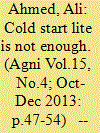

|
|
|
|
|
| Publication |
2013.
|
| Summary/Abstract |
In the wake of the Kargil War, India developed a limited war doctrine. The key elements of this doctrine are that is a proactive and offensive. It is proactive in the sense that while being strategically reactive, for instance to terror provocation emanating from Pakistan, it is proactive at the operational level in choosing the time and place of conventional response and shaping of the battle. It is offensive in terms of its intent of taking the battle to the enemy, fighting on and making gains on enemy territory and its aim plus of punishing the Pakistan military.
|
|
|
|
|
|
|
|
|
|
|
|
|
|
|
|
| 2 |
ID:
125928
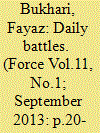

|
|
|
|
|
| Publication |
2013.
|
| Summary/Abstract |
After a decade of peace, the Line of Control (LC) in Poonch sector is hot again following the killing of five soldiers by Border Action Team (BAT) of Pakistan army at Khari Karmara village in Poonch sector on August 6. This was the second BAT action in Poonch sector this year. Earlier, two soldiers were beheaded early January. The intense LC firing started three days after the BAT action only after the army got a go ahead for a befitting reply to Pakistani ceasefire violations in the sector.
|
|
|
|
|
|
|
|
|
|
|
|
|
|
|
|
| 3 |
ID:
166831
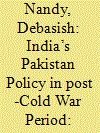

|
|
|
|
|
| Summary/Abstract |
The crux of Indo-Pak relations is confined within hard diplomacy. The arms race and process of militarization have vehemently affected bilateral relations between the Stwo neighbours. When a relationship starts with antagonism, then it might hardly transform into friendship. Both countries are federal with plural society. While Pakistan is the worst example of pluralism, India is a classic example of pluralistic idea. Regarding multiculturalism and communal tolerance, India’s perception is different from Pakistan. Pakistan had built up close ties with Islamic states, which has a dual purpose to seek an Islamic identity on one hand and obtain economic assistance on the other. It is in this context, this paper will try to examine India’s policy towards Pakistan, especially during Narendra Modi’s first tenure as Prime Minister and the role of external powers in Indo-Pak relations.
|
|
|
|
|
|
|
|
|
|
|
|
|
|
|
|
| 4 |
ID:
181477
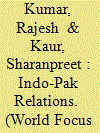

|
|
|
| 5 |
ID:
091840
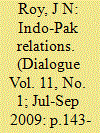

|
|
|
|
|
| Publication |
2009.
|
| Summary/Abstract |
Indo-Pak relations have never been easy during the last sixty-two years. More one tries to change it more it remains the same. Four wars, including Kargil (1999), numerous rounds of talks, efforts by outside power to mediate, directly or indirectly, has not borne any fruits.
|
|
|
|
|
|
|
|
|
|
|
|
|
|
|
|
| 6 |
ID:
148828
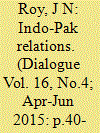

|
|
|
|
|
| Summary/Abstract |
Indo-Pak relations have never been easy during the last sixty-seven years. More one tries to change it, more it remains the same. Four wars, including Kargil (1999), numerous rounds of talks, efforts by outside powers to mediate directly or indirectly, has not borne any fruit. Baggage of history of partition, deep suspicions and lack of trust and perceived grievances have made India and Pakistan adversorial neighbours. Any change must address the need for an attitudinal and structural shift between a “status quoist” India and “Revisionist” Pakistan. Thus, the only way forward is to jettison the past and mutual prejudices and shibboleths it has spawned. Indo-Pak relations can only normalise if both the countries decide to live in future and not in the past. For this one requires statesman like political culture in both the countries, which was visible for a brief period between 2004-2007, but has, alas, disappeared. It is the mindset which is the main problem and has to change. The Mumbai massacre (26.11.08) by Pakistan based LET/JUD and strong protest against the Prime Minister of India for agreeing to resume dialogue at Sharm-el-Sheikh (13 July, 2009), and presently reservations over the NDA govt.’s decision to resume dialogue process underlines that nothing has changed and that both the countries for the time being are condemned to live in their past. Presently, it may also be subject to external developments in the region.
|
|
|
|
|
|
|
|
|
|
|
|
|
|
|
|
| 7 |
ID:
148829
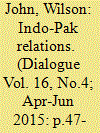

|
|
|
|
|
| Summary/Abstract |
India’s relationship with its immediate neighbour, Pakistan, has been fraught with uncertainty and distrust. India’s attempts to reach out to its difficult neighbour since 1947 have met with frustrating antagonism and war. Rarely has Pakistan responded to these overtures positively. And when it did, it has been with an ulterior motive to harm India and its interests. The result has been that the India-Pakistan relations have stood still at a crossroads, going nowhere, for more than half a century now.
|
|
|
|
|
|
|
|
|
|
|
|
|
|
|
|
| 8 |
ID:
176000
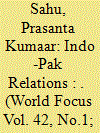

|
|
|
|
|
| Summary/Abstract |
Benazir Bhutto around five years before coming to power had written in her book, “All sections of patriotic opinion are now convinced that these relations (i.e. relations with India) need to be improved.” Indeed, we have to strive for a rapprochement - the people of Pakistan - want peace, above all, with India. So what’s up with Kashmir? Two points can be made instantly! The Simla Agreement has established an appropriate basis for this old conflict to be resolved peacefully.
|
|
|
|
|
|
|
|
|
|
|
|
|
|
|
|
| 9 |
ID:
165946
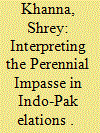

|
|
|
|
|
| Summary/Abstract |
Since the September 2016 attack in Uri, Indo-Pak relations have steadily gotten worse. India cites Pakistan-sponsored terrorism in Kashmir as the major reason for this deterioration, with the 14 February 2019 bombing at Pulwama as the most recent dramatic example; Pakistan blames Indian atrocities in Kashmir. But after every attempt to initiate dialogue, there is a return to hostility. This paper analyzes this cyclical pattern of dialogue, estrangement, and hostility in Indo-Pak relations. Further, it seeks to explain the structural, ideational, and strategic aspects of the problem and to outline a course correction in Indian foreign policy.
|
|
|
|
|
|
|
|
|
|
|
|
|
|
|
|
| 10 |
ID:
047119
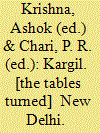

|
|
|
|
|
| Publication |
New Delhi, Manohar Publishers and Distributors, 2001.
|
| Description |
341p.
|
| Standard Number |
817304366X
|
|
|
|
|
|
|
|
|
|
|
|
Copies: C:1/I:0,R:0,Q:0
Circulation
| Accession# | Call# | Current Location | Status | Policy | Location |
| 044364 | 355.0209546/KRI 044364 | Main | On Shelf | General | |
|
|
|
|
| 11 |
ID:
161791
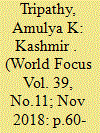

|
|
|
|
|
| Summary/Abstract |
The peace-process is complicated and determined by the terrorist activities of Muslim separatist groups working in Jammu and Kashmir. As long as this terrorism is not removed totally, peace between the two countries is a distant dream. 2019 will witness another General Election.
|
|
|
|
|
|
|
|
|
|
|
|
|
|
|
|
| 12 |
ID:
169807
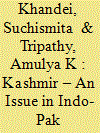

|
|
|
|
|
| Summary/Abstract |
The present history of Kashmir begins with the Treaty of Lahore of8 March 1846, which settled the British conquest of the Sikh Empire.1 The Sikhs had preceded the British in a line of conquerors of the region, and a Dogra chieftain, Ghulab Singh, had been made ruler of Jammu in reward for his services to the Sikh Maharaja Ranjit Singh. By 1839, Ghulab Singh had wrested the territories of Baluchistan and Ladakh from Tibet, thus extending Dogra rule northward and eastward from Jammu.
|
|
|
|
|
|
|
|
|
|
|
|
|
|
|
|
| 13 |
ID:
127713
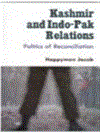

|
|
|
|
|
| Publication |
New Delhi, Samskriti, 2013.
|
| Description |
xxviii, 310p.Hbk
|
| Standard Number |
9788187374787
|
|
|
|
|
|
|
|
|
|
|
|
Copies: C:1/I:0,R:0,Q:0
Circulation
| Accession# | Call# | Current Location | Status | Policy | Location |
| 057596 | 320.9546/JAC 057596 | Main | On Shelf | General | |
|
|
|
|
| 14 |
ID:
128129
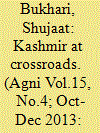

|
|
|
|
|
| Publication |
2013.
|
| Summary/Abstract |
For a long time now Kashmir has been in a status quo in all respects. With a stalemate in peace process between India and Pakistan, Kashmir has been off the agenda, thus giving rise to moments of despair and disillusionment. The result of this discontentment is very much visible on the ground and even a musical concert; otherwise see, as a soothing intervention in a conflict state is shadowed under a barrage of criticism, Zubin Mehta did play with his musical magic in Shalimar garden but the massage that went out was the Kashmir and Kashmiris were not happy with a gesture, which they see strongly believe is to present Kashmir as "normal and peaceful".
|
|
|
|
|
|
|
|
|
|
|
|
|
|
|
|
| 15 |
ID:
125592
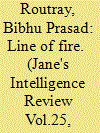

|
|
|
|
|
| Publication |
2013.
|
| Summary/Abstract |
Tension between India and Pakistan are rising again following the killing of five Indian soldiers. Dr. Bibhu Prasad Routray investigates the states of relations between the two countries, and analyses the political risks of escalation.
|
|
|
|
|
|
|
|
|
|
|
|
|
|
|
|
| 16 |
ID:
158129
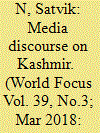

|
|
|
|
|
| Summary/Abstract |
News media known as the fourth estate of democracy has been considered as one of the important pillars of domestic policy making. It provides information and becomes the harbinger of public opinion that the policy makers cannot afford to ignore. The impact of media on foreign policy making is however a little more indirect as the policy making here can not be dependant only on pubic opinion.
|
|
|
|
|
|
|
|
|
|
|
|
|
|
|
|
| 17 |
ID:
126177
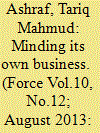

|
|
|
|
|
| Publication |
2013.
|
| Summary/Abstract |
Most countries deploy selected serving military officers as attachés/advisers in their embassies abroad. Though not categorised formally as spies, these military officers do act as the eyes and ears of the intelligence organisation of their native countries. The number of military officers deployed at the embassies in different countries depends on, and varies with, the degree of military interest that one country has in another.
|
|
|
|
|
|
|
|
|
|
|
|
|
|
|
|
| 18 |
ID:
126365
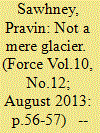

|
|
|
|
|
| Publication |
2012.
|
| Summary/Abstract |
Disconnect between political and military leadership in India came in public view on 13 June 2005. On becoming the first Prime Minister to visit the Siachen base camp, Manmohan Singh, to the horror of the Army Headquarters said that he desired to convert the point of conflict between India and Pakistan into a symbol of peace. On return, the Prime Minister was given a comprehensive briefing at the military operations branch by the army; he has since maintained a stoic silence on the Siachen resolution, having accepted to be guided by the army's wisdom, which itself, unfortunately, has not been stellar.
|
|
|
|
|
|
|
|
|
|
|
|
|
|
|
|
| 19 |
ID:
158753
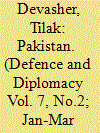

|
|
|
| 20 |
ID:
129361
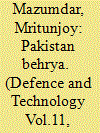

|
|
|
|
|
| Publication |
2012.
|
| Summary/Abstract |
Pakistan's navy (Pak Behrya) with an estimated strength of 25000+ personnel, is an medium size navy with a relatively well balanced fleet and naval air assets. On the one hand, the Pakistan Navy (PN) finds itself trying to counter an increasingly powerful Indian Navy (IN). on the other hand, it seeks to play a greater role in providing maritime security in Persian Gulf given that it sees itself as the eminent naval force in the middle east/ Persian gulf region. As a result it finds itself stretched to the limit.
|
|
|
|
|
|
|
|
|
|
|
|
|
|
|
|
|
|
|
|
|